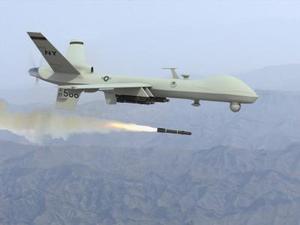UN criticism of U.S. UAV war not likely to stop CIA drone strikes
A UN report on the U.S. UAVs against terrorists and insurgents calls on countries to lay out rules and safeguards for carrying out the strikes, publish figures on civilian casualties, and prove they have attempted to capture or incapacitate suspects without killing them

Missile launch from a Predator drone // Source: for.org.uk
The U.S. government’s covert program using UAVs to strike at terrorists inside Pakistan, a campaign which has increased dramatically since the Obama administration took office, is not likely to stop or change, despite new criticism from a UN human rights expert.
U.S. officials insist the CIA program has been an effective tool to take out insurgents along the Afghanistan-Pakistan border, particularly those hidden beyond the reach of the military. The stepped-up use of drones over the past year has shown no signs of slowing down and was credited earlier this week with the killing inside Pakistan of al Qaeda’s third in command.
The AP reports that the Obama administration does not acknowledge the secret program, but one senior U.S. official defended its use Wednesday, saying a careful and rigorous targeting process is used to avoid civilian casualties. The official, who is familiar with the operation, spoke on condition of anonymity because the program is classified.
The program, which officials say has killed hundreds of insurgents in dozens of strikes during the past year, has been condemned by critics who say it may constitute illegal assassinations and violate international law. They argue that intelligence officers conducting the strikes could be at risk of prosecution for murder in foreign countries.
In a 29-page report released Wednesday, Philip Alston, the independent UN investigator on extrajudicial killings, called on countries to lay out rules and safeguards for carrying out the strikes, publish figures on civilian casualties, and prove they have attempted to capture or incapacitate suspects without killing them.
“Unlike a state’s armed forces, its intelligence agents do not generally operate within a framework which places appropriate emphasis upon ensuring compliance with international humanitarian law, rendering violations more likely and causing a higher risk of prosecution both for war crimes and for violations of the laws of the state in which any killing occurs,” wrote Alston, a New York University professor.
The report to the UN Human Rights Council puts unwanted scrutiny on the intelligence operations of the United States, Israel, and Russia, who Alston says are all credibly reported to have used drones to kill alleged terrorists and insurgents.
He said the drone strikes by intelligence agencies launched in Afghanistan, Pakistan, and elsewhere are particularly fraught because of the secrecy surrounding them.
AP notes that other experts disagree. “Drone operations are essential,” said Bruce Riedel, a former CIA officer and a senior fellow at the Brookings Institution Saban Center.
